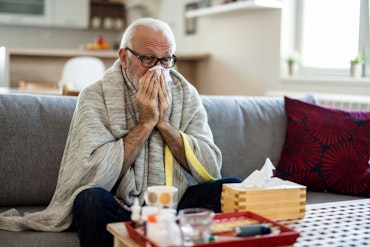Why care is important and discrimination is detrimental for people with dementia
Two new reports have emerged showing the impacts of discrimination towards people living with dementia and how caring for them should be recognised globally as a human right.
![<p> Two new reports have emerged showing the impacts of discrimination towards people living with dementia and how caring for them should be recognised globally as a human right. [Source: iStock]</p>](https://agedcareguide-assets.imgix.net/news/articles/21_9_22-dementia-reports-TAC.jpg?fm=pjpg&format=auto&w=550&q=65)
Two new reports have emerged showing the impacts of discrimination towards people living with dementia and how caring for them should be recognised globally as a human right. [Source: iStock]
If you or your loved one has received a dementia diagnosis, you may be aware that people with dementia can sometimes be looked at differently and may not even be receiving the appropriate care they need to maintain a good quality of life.
Currently, more than 487,500 Australians are living with dementia and it is forecast 139 million people globally will be living with dementia by 2050.
Dementia care and support is really important for newly diagnosed older people, and it is vital that people with dementia are not discriminated against because of their illness.
What impacts does discrimination have on older people?
The Dementia Australia report shows discrimination towards people living with dementia can lead to delays in diagnosis and increased social isolation.
This can be a detrimental problem as an early diagnosis, community awareness and support are important to properly caring for people with dementia.
Dementia Australia Chief Executive Officer (CEO) Maree McCabe confirms delays in diagnosis and accessing services can have serious consequences for the physical, cognitive and psychosocial health of the person living with dementia.
“An early diagnosis means people with dementia can access vital support and resources sooner, to help support a better quality of life and to plan for the future,” she says.
Stigma and discrimination associated with a dementia diagnosis can discourage you or your loved one from seeking health care and decreases their likelihood of engaging socially with family, friends and the broader community.
Eliminating stigma
Bobby Redman, a retired psychologist living with dementia and Chair of the Dementia Australia Advisory Committee, says once you realise that a purposeful life can continue after diagnosis, the stigma will be lifted and the fear will be reduced.
“People living with dementia can continue to participate in a meaningful way within their communities,” she says.
“As a person living with dementia, I urge that healthcare professionals and the general community recognise that a little support makes a big difference.”
Dementia Australia and other groups are actively attempting to eliminate the stigma around dementia and people who live with the condition.
Recent research has found that improved dementia care access will hugely benefit older Australians with the condition, as well as educate the general public and break down the stigma around dementia.
Bolstering dementia care in Australia
Another report has also been released this week by the University of New South Wales (UNSW), where experts call for post-diagnosis dementia care to be considered a human right, prompted by new data showing that up to 85 percent of people living with dementia may not receive post-diagnosis care, treatment or support.
The UNSW Sydney’s Centre for Healthy Brain Ageing (CHeBA) collaborated with Alzheimer’s Disease International on the report, urging dementia care to be considered a human right and for post-diagnosis care to be considered in every country’s national dementia planning.
The report says there is urgent need for significant improvements to essential post-diagnosis treatment, care and support services.
Contributing Author of the report, Professor Henry Brodaty, says along with improving diagnosis rates, post-diagnosis dementia care must be recognised as a human right.
“In the same way that people who have had a stroke or heart surgery are offered rehabilitation and continued support, people diagnosed with dementia deserve the opportunity to live positively, build on their assets and compensate for their disabilities using a reablement framework,” says Professor Brodaty.
Post-diagnosis dementia care, treatment and support refers to interventions that can improve your or your loved one’s quality of life.
These include both pharmacological and non-pharmacological treatments, rehabilitation, cognitive stimulation therapy, access to healthcare and respite.
CHeBA recommends the first step Australian Governments should be committing to is identifying a trained ‘navigator’ or ‘key worker’ to act as a liaison and support newly diagnosed persons with dementia.
These liaisons would give you clear access to health resources, care, information, advice, and life adaptations.











![The new Aged Care Act exposure draft is slated for release in December of 2023, but advocates hope to see it rolled out on January 1, 2024. [Source: Shutterstock]](https://agedcareguide-assets.imgix.net/news/articles/wp/agedcareact__0811.jpg?fm=pjpg&w=520&format=auto&q=65)












Comments